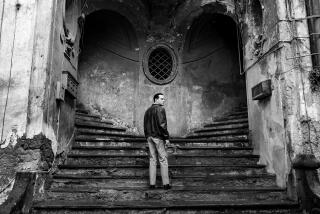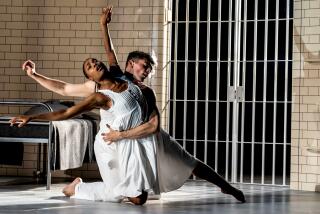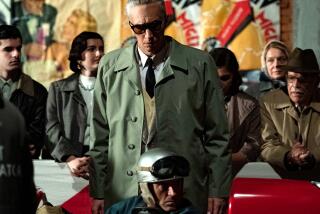Tamed ‘Inferno’ Keeps Hell’s Horrors Under Control
- Share via
Banished from his beloved Florence in 1302, Dante Alighieri knew what it was like to be flung into the outer circles of darkness. Dante’s enduring sense of loss richly informs Robert Scanlan’s staging of “The Inferno,” which closed Sunday after a three-day run at the Getty Center’s Harold M. Williams Auditorium. But Dante’s vibrant humanism, the sheer sweep and vulgarity of his epic vision, largely eludes Scanlan and his cast.
Granted, “The Inferno” presents singular challenges to any theatrical interpreter. The first great literary populist, Dante insisted on writing in Italian rather than the scholarly Latin of his day. How, then, does one preserve the immediacy of his vernacular and render it relevant to a modern-day audience? And how does one go about dramatizing the gory sufferings of Dante’s damned without descending into excess?
Robert Pinsky’s vibrant and accessible translation, adapted here by Scanlan, largely addresses the first problem. The United States’ poet laureate, Pinsky is a thoroughly disciplined scholar who knows his way around a canto. His measured cadences smoothly escort us down Dante’s “deep and savage road” all the way through to the final, cataclysmic vision of the gigantic, three-faced Lucifer--a truly creepy guy who makes the monsters of today’s splatter movies seem positively prosaic.
Yet, in taming the lurid elements of “Inferno,” Scanlan misses the boat at the gates of Hell. Despite the elaborate elements of the production--the mirrored scaffolding of John Michael Deegan and Sarah G. Conly’s set, the eerie dissonance of the sound design, original music by Christopher Walker and Bruce Saylor--Scanlan’s measured, austere staging is only a demi-step away from a spoken word piece. From the opening of the play--a protracted and lugubrious violin solo--to its final moments, Scanlan’s funereal reverence seems more suitable to a requiem than a living piece of theater.
The dulcet-voiced performers--Michael Balcanoff, Leslie Beatty, Bill Camp and Reg E. Cathey--serve the language well, but are less successful in exploring the subtexts underneath the poetry. The pathos of the doomed lovers Francesca and Paolo--whose piteous plight has been a favorite subject of artists and poets for generations--is reduced here to academic dryness.
Still, this production has its lively moments.
Balcanoff sends off sparks as the traitorous Count Ugolino, who, left to starve in a sealed tower, cannibalizes the corpses of his own children, then spends eternity gnawing on the carcass of an archrival. It’s a hellish portrait that must have terrified generations of Italians onto the straight and narrow--and still penetrates even the most jaded psyche with an uncomfortable jolt.
More to Read
The biggest entertainment stories
Get our big stories about Hollywood, film, television, music, arts, culture and more right in your inbox as soon as they publish.
You may occasionally receive promotional content from the Los Angeles Times.










